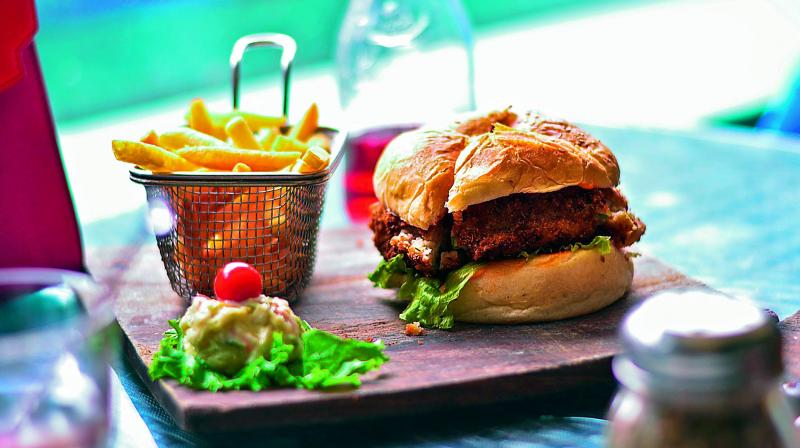Celebrities take on: Fat tax on junk food
After Kerala, it is Maharashtra which is all set to make fast food healthy.

We get celebrities to give their take on a current issue each week and lend their perspective to a much-discussed topic. This week we talk about: Fat tax on Junk food
After Kerala, it is Maharashtra which is all set to make fast food healthy. The state believes fast food is a leading cause for obesity and lifestyle diseases such as diabetes. It was only in July this year that Kerala government proposed a 14.5 per cent “fat tax” on burgers, pizzas and other junk food served in branded restaurants. We ask nutritionists, foodies and chefs whether such taxes help curb consumption. They also suggest a few effective methods that could fight obesity.
Tonny Valluvassery, actor and foody: ‘It is not fully effective’
I don’t think imposing such a tax helps in curbing obesity. And in Kerala, we consume food items like porotta and beef, which are rich in calories. Even the red rice that we consume on a regular basis can cause weight gain. The imposition of tax may help in curbing it to a small extent but it is not fully effective. If the motive was to curb obesity then a tax should’ve been imposed on anything that would make a person fat. I walk 4 to 5 kilometres to keep my body motions flexible.
Rakhee Vaswani, chef: ‘Heavy tax is bound to deter people’
To some extent, yes; a 14.5 per cent tax is actually a lot. Especially, today the awareness about fitness and health has risen significantly that has made people much more conscious about what they consume. Also, the main reason people frequent these fast food joints is that the prices are reasonable. The moment the prices go up, the lines are going to get shorter. The heavy tax is bound to deter people but what we need to see is for how long people stand by it. The effectiveness of this tax depends on how well people control their urges because fast food is known to be addictive. In my opinion, the people who live on fast food might still end up going to the joints. Besides, people can’t be forced to consume or be restricted from consuming what they want. With such taxes consumers are being treated like children. Therefore, a fine line needs to be drawn somewhere.
Samira Chopra, restaurateur: ‘Balanced meals... more important’
I don’t believe the ‘Fat Tax’ is the answer to any sort of obesity and lifestyle diseases. There are so many issues with this proposition. Firstly, if the aim is reducing obesity through controlling food substances, why not tax all sorts of fattening food items irrespective of their cuisine. Indian food items like dal makhni or paranthas are considered fattening, so are deep fried Chinese dishes, etc. While the sentiment is correct, I don’t believe the approach is. Balanced meals, exercise and education is more important. The government should develop or enhance the class curriculum on nutrition and health and boost the appeal of physical exercises. This benefits every student (irrespective of his/her food habits). Build gyms or sports centres in colonies and schools and encourage healthy eating habits. We should follow examples of countries having campaigns like ‘Got Milk’, which focuses on the importance of having milk, and thus calcium in one’s diet, we have had campaigns on promoting eating of proteins like eggs. Why don’t we as a nation send out positive messages to the people? It’s better to enable a generation through education and develop a culture of a better lifestyle than imposing a tax.
Sindhu Loknath, actor: ‘People who want to eat will still continue eating’
Well, while the intention seems fair, I am highly skeptical about its feasibility. For instance, when fuel prices were hiked or a ban on tobacco ensued, it sparked curiosity and garnered attention. But there was little improvement, as it didn’t stop those from consuming it. The government can’t do much about altering one’s personal preferences. People who want to eat will still continue eating. It’s always up to an individual to decide. They are the ones who make this choice. The only effective measure is to educate yourself and your kids and spread awareness of the bad after-effects on ones health. Also, restaurants could implement customisation and delectable presentation of healthy food to encourage people to turn over a new leaf.
Sherlyn Chopra, Actor: ‘Lead a healthy lifestyle’
As a health conscious individual, I strongly feel that the most effective way to encourage and inspire others to lead a healthy lifestyle would be to spread awareness about the innumerable benefits of healthy eating and healthy living. The end objective in this case should be to motivate the unhealthy to take step-by-step measures to feel and look healthy. Health and well-being cannot be achieved through relentlessness. It is about upgrading one’s mindset to lead a high quality lifestyle in terms of physical, mental and spiritual fitness.

